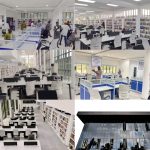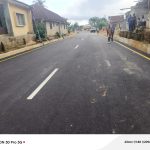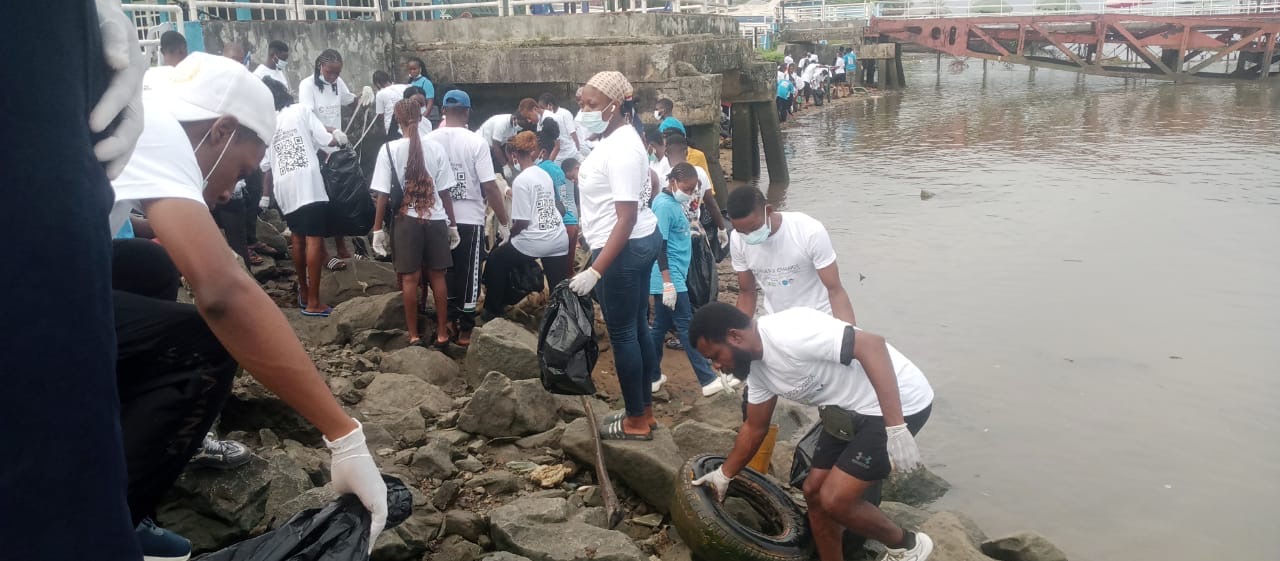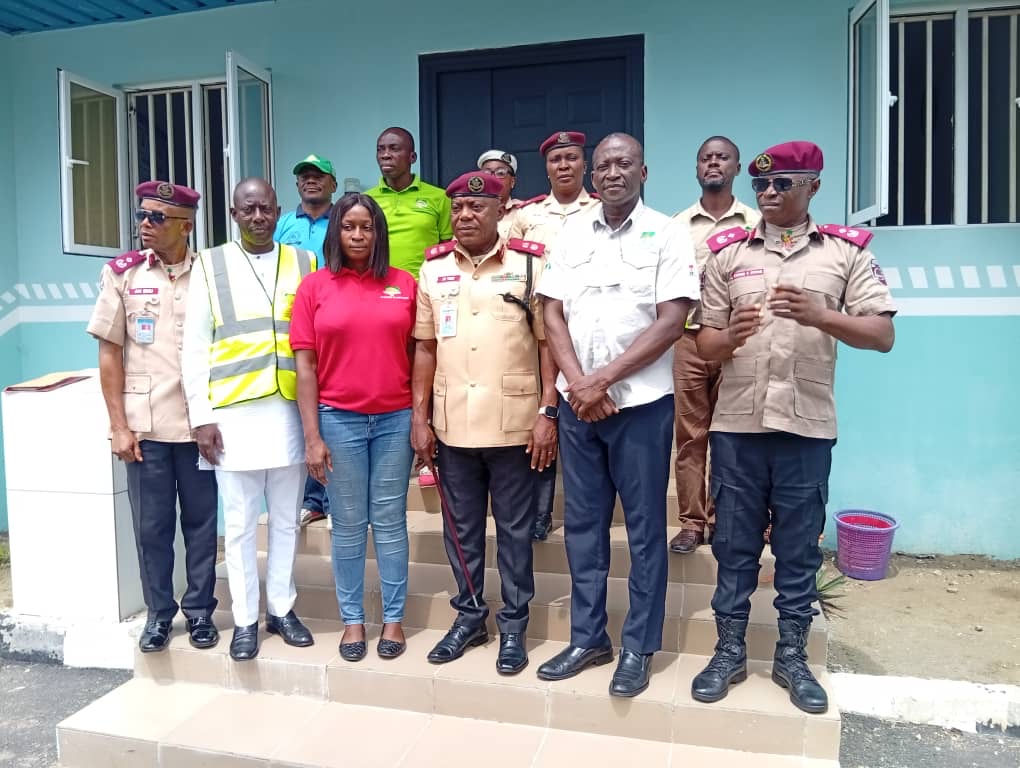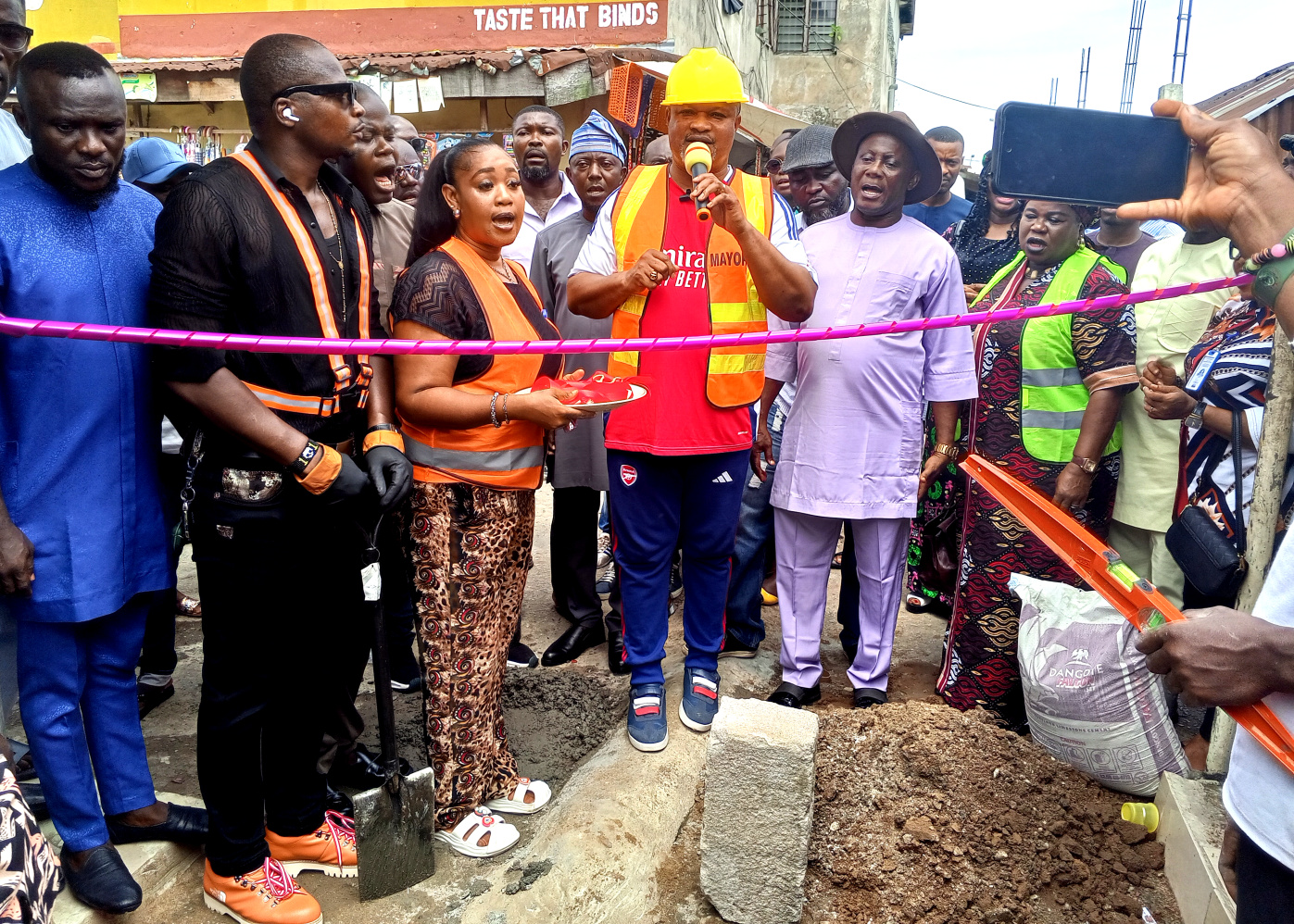The clean up exercise at Marina beach.
By Anietie Akpan
As part of efforts to keep the rivers, oceans free and clean, the United Nations Children’s Fund (UNICEF) through the Green Rising Initiative, mobilized over 200 young people to take action in cleaning up the Marina Beach of the Calabar River in Calabar, Cross River State.
The clean up exercise at the beach, on Saturday, April 5, was the concluding part of the three day (April 3-5, 2025) Climate Education and Awareness programme on the theme: “Tides of Change-Young Voices for a Greener Coast”; powered by UNICEF, GreenRising, GenUnlimited, YPAT and the UNICAL and implemented by Plogging Nigeria and Biodiversity Rescue Club (BRC) Nigeria.
It commenced in the early hours of Saturday, at the shores of the Marina beach which the high tide had earlier deposited large quantity of debris, mostly plastics and cans, and at low tide the coastline was dry for the students to remove the debris before the high tide would come and swim them back to the river.
Dressed in T-shirts with the inscription: “Tides of Change-Young Voices for a Greener Coast” and “Be A UNICEF Green Rising Champion”, (front and back), hand gloves and shoes for safety, the students moved from point to point and cleared the debris in large areas of the Marina beach and by the time the high tide arrived, the cleaned areas were clean and free.
The UNICEF WASH Specialist, Enugu Field Office, Mrs. Rebecca Bolatito Gabriel in a statement made available to some newsmen said, “by this, young people are taking action to reduce plastic pollution by cleaning up all forms of plastics that are littered at the beach. The plastics that are collected will be sorted and recycled – hence reducing the amount of plastic in the environment and consequently its impact on the climate”.
Plastic pollution in water bodies according to the statement, “poses a serious threat, causing harm to marine life through ingestion, entanglement, and the introduction of harmful chemicals, as well as impacting ecosystems and human health.
“One of the biggest sources of plastic in our seas is simply littering. Rubbish left on the beach after a day out, refuse fly-tipped in our rivers and waste blown in from our streets – all contribute to a massive problem.
“A lot of this rubbish comes from single-use plastics. Straws, bottles, bags, crisp packets, stirrers, coffee cups, yoghurt pots – the list goes on. A huge proportion of our waste comes from plastics that we use just once and then throw it away. Sometimes we put it in the bin, but sometimes we don’t, and it works its way into our seas. These single-use items are also notoriously hard to recycle”.
Some of the participants interviewed during the cleanup exercise, expressed concerns with the activities of humans in dumping waste anyhow as these waste products often find their way into the rivers and oceans causing pollution and climate change.
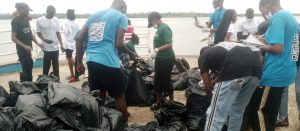
Some the recovered waste being parked by the participants.
One of the participants, a 400 level student of Public Health, University of Calabar, Gift Akoh, said, “we are doing the beach clean up today (Saturday). This can be a habitat for mosquitoes and other insects but if we can keep the beach clean, it can reduce the way and manner mosquitoes breed here and will help mitigate climate change”.
Apparently excited to be part of the clean up, Akoh promised to be a true “UNICEF Green Rising Champion” by taking the message of climate change far and wide saying, “I want to say thank you to UNICEF for coming up with this initiative, it shows that we really want a change”.
Another participant, Joshua Otie, a 300 level student of the Department of Public Health, University of Calabar, opined, “I run my own organisation, called Hope Assured Foundation. I am here with some of my members as volunteers”.
“Globally there has been a great surge for climate change issues rising to Ozone depletion due to human activities and most of these activities include the indecent use of plastics”, he said, noting that, “there is no adequate facilities in recycling these plastics”.
The idea around this by UNICEF and other partners, she said, “is to first create the awareness that our river bodies are also breeding lives and some of the things we throw into the rivers or ocean cause harm to the river bodies and some how at large, our eco system.
“We consume things from the river and plastics have chemicals that have shown to be contributing to the rate of cancer globally. In fact, of recent, cancer is the second highest killer disease in the world. Most of these is because of the chemicals that are found in plastics.
“The ecosystem is being degraded because of these human activities. We are here to first create awareness that, this is wrong and also take action as young people. And of course, the world is ours in the nearest future but the leaders of today and the nearest future so we are taking action as young people by cleaning up the beach and in generally taking climate action to sustain the earth”.
In this regards, “I want to say thank you to UNICEF and their partners for initiating this and funding the idea. We are super excited that this is happening, like Oliver twist, we are asking for more. This is just a little in the ocean, we want to see more of these initiatives that are young people centered because young people are at the forefront of effecting the change we want to see in the community”, Otie said.
One of the volunteers from Nigeria Red Cross Society, Cross River Branch, a Youth Coordinator, Christina Etim, said, “we are cleaning up the beach to make the environment safe for the habitants in the water and around. Cleaning up the beach will help protect the habitats as you know, human attitudes, activities towards the environment is why we are facing climate change.
“If you check around, you will see plastics at the shores of the river, which is not good for the habitants of the water, so we need to change our attitude and be friendly to the environment and it will go a long way in tackling the effects of climate change”.
